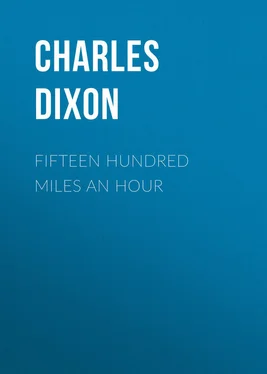Charles Dixon - Fifteen Hundred Miles An Hour
Здесь есть возможность читать онлайн «Charles Dixon - Fifteen Hundred Miles An Hour» — ознакомительный отрывок электронной книги совершенно бесплатно, а после прочтения отрывка купить полную версию. В некоторых случаях можно слушать аудио, скачать через торрент в формате fb2 и присутствует краткое содержание. Жанр: foreign_antique, foreign_prose, на английском языке. Описание произведения, (предисловие) а так же отзывы посетителей доступны на портале библиотеки ЛибКат.
- Название:Fifteen Hundred Miles An Hour
- Автор:
- Жанр:
- Год:неизвестен
- ISBN:нет данных
- Рейтинг книги:4 / 5. Голосов: 1
-
Избранное:Добавить в избранное
- Отзывы:
-
Ваша оценка:
- 80
- 1
- 2
- 3
- 4
- 5
Fifteen Hundred Miles An Hour: краткое содержание, описание и аннотация
Предлагаем к чтению аннотацию, описание, краткое содержание или предисловие (зависит от того, что написал сам автор книги «Fifteen Hundred Miles An Hour»). Если вы не нашли необходимую информацию о книге — напишите в комментариях, мы постараемся отыскать её.
Fifteen Hundred Miles An Hour — читать онлайн ознакомительный отрывок
Ниже представлен текст книги, разбитый по страницам. Система сохранения места последней прочитанной страницы, позволяет с удобством читать онлайн бесплатно книгу «Fifteen Hundred Miles An Hour», без необходимости каждый раз заново искать на чём Вы остановились. Поставьте закладку, и сможете в любой момент перейти на страницу, на которой закончили чтение.
Интервал:
Закладка:
For many weeks after the events recorded in this chapter, the Sirius sped on without a single notable occurrence to relieve the monotony of the journey. Our first Christmas Day was observed with all customary honours, Sandy providing us with a royal feast; and the evening was given up to conviviality and amusement. The Doctor and Temple played chess; Sandy, with his short pipe and unlimited whiskey, now and then sang us a North-country ballad; Rover lay quietly at his master's feet; Graham smoked huge Cabanas, told stories, fired off jokes, and sang many a Yorkshire ditty. All of us felt the magic spell of Christmas-tide, and the observance of the festal day filled our hearts with renewed hope, and served to increase and strengthen the bond of brotherly unity in our little party.
We were now 8,820,000 miles from Earth, or, reducing this vast number to more comprehensive language, we had accomplished slightly more than a quarter of our journey. We still continued to find ether sufficiently dense to be converted into a breathable atmosphere, and into water – everything promised well for the ultimate success of our daring enterprise. Alas! for all human hopes and human anticipations; we little dreamed of what the future was about to bring!
CHAPTER IV.
AWFUL MOMENTS
Day after day, week after week, and month after month sped the Sirius on its journey, like a meteor across the gulf of space. We had now been eighteen months away from Earth, and our distance from that planet we computed to be quite nineteen millions of miles. The Earth was remarkably small in appearance, and the moon could only be detected through a glass. On the other hand, Mars had risen in elevation, and sensibly increased in brilliancy and apparent size. Other heavenly bodies had also changed considerably in their aspect. Some had got much larger, others smaller, many had disappeared entirely from our vision, whilst several new orbs had been discovered. The Doctor was able to make many observations of the little-known asteroids which travel round the sun between the orbits of Mars and Jupiter. Scores of new ones were seen.
For a long time Doctor Hermann had been worried by the course which the Sirius was taking. In spite of the fact that we were apparently steadily travelling onwards across the vast belt of space between Earth and Mars, certain of his calculations appeared to demonstrate that we were being drawn rapidly towards the sun! The quantity of water we condensed from the atmosphere now became very small, and eventually failed altogether, so that we had to depend upon our scanty store and the lozenges.
After an unusually long and tedious day, the Doctor gloomily threw aside his papers and his instruments, exclaiming to Graham in almost pathetic tones, "It is as I have long expected; the sun is too much for us!"
"But, Doctor, you may have erred in your calculations. Do you really think it wise to take such a pessimistic view of our situation?" answered Graham, with a hopefulness that he was far from actually feeling.
"If Temple can spare us a moment, ask him to join us, and I will endeavour to explain our actual position, and the prospects we have before us."
"A horrible one! A most horrible one!" the Doctor muttered under his breath, as Graham walked thoughtfully away.
Temple and Graham joined the Doctor almost immediately.
"Now, Doctor, what have you got to tell us this time? What new discovery have you made? Nothing unpleasant, I sincerely hope," said Temple, in his usual cheery way.
"My dear friends," began the Doctor, "I am afraid I have bad news to communicate – very bad news. But let us look the situation squarely in the face, and discuss it calmly and philosophically, as becomes intelligent men."
"Many weeks ago," continued the Doctor, "I explained to Graham and yourself that our centre of gravity had changed from the Earth to the sun; instead of earth glimmering at our feet, nineteen millions of miles below us, we have the fiery sun, as both of you cannot have failed to observe. This I must hasten to explain, is cause for no surprise; it is just what I expected would be the case until we came within the attractive forces of Mars. But my instruments have demonstrated that our motors are now absolutely of no use. They are working just as usual, but our speed increases rather than diminishes, and from this I infer we are influenced by some vast attractive force. That centre of attraction to which we seem hurrying can only be the sun! No further words of mine are needed to render more clear the horrible doom which awaits us."
As he finished speaking, the Doctor rested his head on his hand, the usual attitude he assumed when engaged in deep thought.
"But, Doctor, before we take all this for granted, at least let us satisfy ourselves more completely that things are really so bad," said Graham.
"No use, Graham, no use; I have studied these matters too long and too carefully needlessly to alarm you," answered the Doctor.
"Well, Doctor," said Graham, "at least allow me to stop our motors. Then what you say cannot possibly be refuted."
"I think Graham is right, Doctor," remarked Temple. "It seems to me a very practical suggestion."
"You may do so if you like, but it is trouble thrown away," the Doctor answered.
Graham was already hastening from the laboratory down the steps to the engine-room, followed by his two friends, and a moment afterwards the machinery ceased to work; the bright cranks and wheels and rods were still; the motors ceased to revolve. At last this beautiful monument of engineering skill, which had kept incessantly at work for upwards of eighteen months, was stopped, and breathlessly the three men awaited the result.
Doctor Hermann, cool and collected even in such awful moments, walked slowly back to the laboratory to consult his instruments. Graham and Temple followed, too excited to speak.
"Well, Doctor," said Temple at last, after he had patiently waited his investigation, "what are your conclusions?"
With marvellous coolness, as though answering the merest commonplace remark, Doctor Hermann replied: "It is as I said before; the Sirius is falling with ever-increasing speed into the sun! We are lost!
"Our doom, even if our speed goes on increasing, cannot overtake us for several years," continued the Doctor, "but I doubt if our supplies could hold out for such a period."
"Doctor," broke in Temple excitedly, "that is poor comfort; you ask us too much endurance. I, for one, will not, cannot, go on in such misery, only to be overwhelmed at last. Two alternatives are left to us. We can either go on in a lingering agony of suspense, and meet our doom by starvation, or by fire; or, we can end our woes swiftly and effectually with these" – and as he spoke he pointed to the four nickel-plated revolvers hanging loaded against the wall. "We can but die like men!"
"I must confess, if all hope is really gone, that I incline to Mr. Temple's view of the situation, and would prefer a sharp and practically painless death to, it may be, years of horrible suspense, crowned with the ten thousand times more awful fate of being hurled into yonder furnace at last," said Graham.
"Temple, and you, too, Graham," answered the Doctor, "you surprise me by such a shallow mode of reasoning. Listen to me. Both of you are free agents to act as you may think fit; but before you rashly take your lives, at least wait a little longer. We are in the midst of strange surroundings, and still stranger possibilities. There is nothing to warrant you in taking such extreme measures."
"My sentiments, Doctor, must, I suppose, be attributed to my weakness," answered Temple.
"You may taunt me as you will," said Graham, "but I believe there are rare occasions in life when self-murder can be no crime – nay, is even justified."
Читать дальшеИнтервал:
Закладка:
Похожие книги на «Fifteen Hundred Miles An Hour»
Представляем Вашему вниманию похожие книги на «Fifteen Hundred Miles An Hour» списком для выбора. Мы отобрали схожую по названию и смыслу литературу в надежде предоставить читателям больше вариантов отыскать новые, интересные, ещё непрочитанные произведения.
Обсуждение, отзывы о книге «Fifteen Hundred Miles An Hour» и просто собственные мнения читателей. Оставьте ваши комментарии, напишите, что Вы думаете о произведении, его смысле или главных героях. Укажите что конкретно понравилось, а что нет, и почему Вы так считаете.












